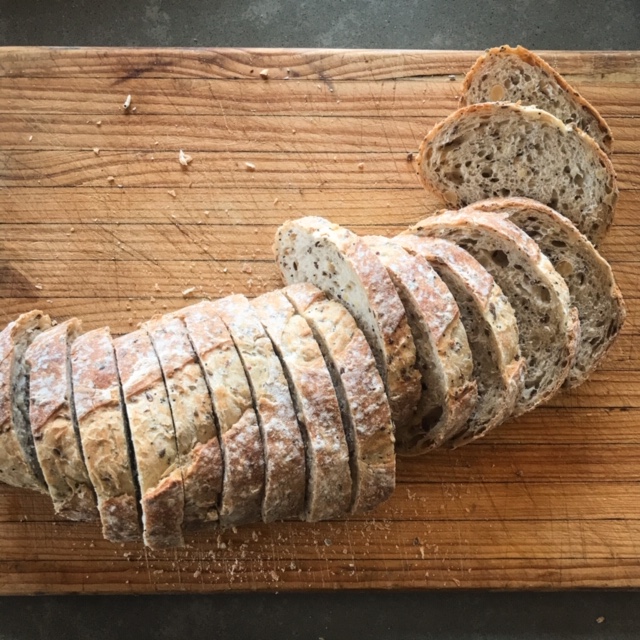As a long time lover of sourdough, it’s about time I share a few words about this type of bread. The process of making sourdough is slow, thoughtful, and nurturing. Care is required as well as the desire to create and share. As a dietitian who adores and encourages the enjoyment of beautiful wholesome food, I would have to say that sourdough would have to be one of the best choices of bread not only because of its health benefits but also because of the love that goes into making every single loaf. It’s a bread that truly nourishes and nurtures us.
Aside from it being delicious when fresh, warmed or toasted and laden with olive oil, butter, smashed avocado or poached eggs (and/or whatever it is you love), here are four reasons why sourdough is so wonderful.
Sourdough is:
1. Rich in nutrients AND the nutrients are more bioavailable to us
Sourdough is often made with the same flours as regular wheat bread a few examples being white, whole-wheat, and rye flour. Both regular wheat bread and sourdough made with whole-grain flours contain minerals including potassium, phosphate, iron, zinc, and magnesium. However, the absorption of these minerals in regular wheat bread is, to a certain extent, limited due to phytic acid found in wheat. Phytic acid, also known as phytate, binds to minerals reducing our body’s ability to absorb them.
So how is sourdough different?
When we make sourdough we create a dough by combining a ‘starter’ or ‘leaven’ (a fermented mixture of flour and water containing microorganisms including wild yeast and lactobacilli) with flour, water, and salt. We knead the dough then leave it to ferment for a period of time before baking it. The fermentation process acidifies the dough, which gives sourdough its unique sour taste, but it also releases phytase, an enzyme that breaks down phytic acid. Long slow fermentation can actually reduce phytic acid up to 90%. With minimal phytic acid, the minerals are more bioavailable to us making sourdough more nutritious.
2. Easier to digest
Not only does phytic acid bind to minerals making them less bioavailable but it can also be a cause for bloating and digestive discomfort. The reason for this is that phytic acid inhibits certain enzymes found in the stomach which are required for the breakdown of proteins and starch. With a lack of digestive enzymes we are unable to efficiently digest proteins and starch and as a result, can feel uncomfortable.
As mentioned above, the fermentation process involved in the making of sourdough releases phytase, an enzyme which breaks down (or ‘pre-digests) phytic acid. Low phytic acid content makes sourdough easier to digest and therefore a lot gentler on the stomach. This is one reason why a lot of people feel better and have better digestion when choosing sourdough over regular wheat bread.
Another reason is the fact that the gluten content in sourdough is lower than that of regular wheat bread. The fermentation process also ‘pre-digests’ gluten, reducing the amount of this protein in the bread dough. For this reason, those with mild gluten intolerance often tolerate sourdough better. The lower phytic acid and gluten content makes sourdough a great choice for those with irritable bowel syndrome too. It’s important to note however that as sourdough is not gluten-free its not an appropriate choice for those with Coeliac Disease.
3. Wonderful for keeping our blood sugar steady
Sourdough, particularly when made with whole-grain flours such as whole-wheat and rye flour, is high in fibre so digested slowly and as a result, has a low glycaemic index (GI). A low GI means that when sourdough is digested the release of glucose into the bloodstream is slower and more steady. This slow-release of glucose helps to keep our blood sugars stable making sourdough (particularly whole-wheat, wholegrain and rye) a great choice for those with Type 2 Diabetes and PCOS. It’s also wonderful for all of us as steady blood sugar keeps us feeling good and energised for longer periods of time.
4. Great for our gut health
Sourdough contains wonderful prebiotics, these being fibres. Probiotics, beneficial bacteria, found in our gut feed on fibre so by enjoying sourdough you are supporting and feeding your microbiome.
With all of the above health benefits, it’s hard not to love sourdough. I hope that in addition to it being tasty and comforting the above has inspired you to start enjoying or continue to enjoy this brilliant type of bread. What’s even better is that we are spoilt for choice when it comes to varieties and accessibility. In addition to this, making it yourself is fun, cheap and easy (well, easy once you know how to make it of course!).
Lara x


